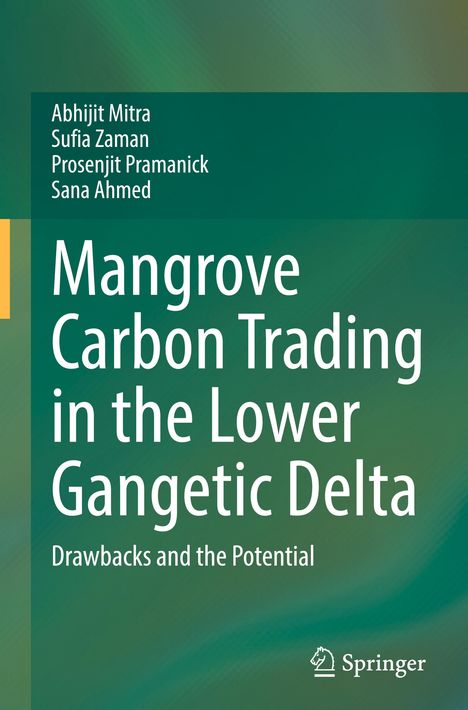Abhijit Mitra: Mangrove Carbon Trading in the Lower Gangetic Delta, Gebunden
Mangrove Carbon Trading in the Lower Gangetic Delta
- Drawbacks and the Potential
(soweit verfügbar beim Lieferanten)
- Verlag:
- Springer, 12/2024
- Einband:
- Gebunden
- Sprache:
- Englisch
- ISBN-13:
- 9783031763151
- Artikelnummer:
- 12137723
- Umfang:
- 296 Seiten
- Gewicht:
- 663 g
- Maße:
- 241 x 160 mm
- Stärke:
- 21 mm
- Erscheinungstermin:
- 15.12.2024
- Hinweis
-
Achtung: Artikel ist nicht in deutscher Sprache!
Klappentext
True mangrove flora and their associates in the lower Gangetic region are noted for their wide spectrum of ecosystem services in which carbon storage and sequestration by the forest is one of the most important components. Many researchers are updating the carbon repository of the lower Gangetic delta mangroves with the aim to ascertain their role to reduce the carbon dioxide level of the near surface atmosphere. However, due to difficulty in assessment, marketing, and lack of clarity over ownership of natural resources, the mangrove-based carbon trading system has not yet crystallized. There is an estimated 13.76 Mha of mangrove forests world-wide, approximately 20% (2.6 Mha) of which is potentially investible for carbon finance projects, based on the probability of imminent threat. The magnitude and the variability of threats to which the mangroves of the lower Gangetic delta are exposed to have made the trading process more complicated. In addition, gaps also exist between the national government policy and the trading of the blue carbon projects, which has kept the future of such projects remain on hold. The authors put forward the views that the creation of more financial facilities for restoration and expansion of blue carbon (preferably mangroves) with the involvement of the local communities can provide the initial capital involved in developing mangrove-based carbon projects. This includes the costs of conducting feasibility studies, implementing capacity-building programs, monitoring the health of the mangrove plantation / restoration on regular basis, and creating mangrove-based alternative livelihood programs that will support island dwellers of the region in order to accelerate the magnitude of mangrove-based carbon projects leading to growth of the mangrove trading market.
Biografie (Abhijit Mitra)
Dr. Abhijit Mitra, Associate Professor and former Head, Dept. of Marine Science, University of Calcutta (INDIA) has been active in the sphere of Oceanography since 1985. He is now the Adjunct Professor of TECHNO INDIA UNIVERSITY, Salt Lake Campus, Kolkata. He obtained his Ph.D as NET qualified scholar in 1994. Since then he joined Calcutta Port Trust, WWF (World Wide Fund), and Ministry of Environment & Forests, Govt. of India in various capacities to carry out research programmes on environmental science, biodiversity conservation, climate change and carbon sequestration. He has to his credit about 228 scientific publications in various National and International journals, and 20 books of postgraduate standards. Dr. Mitra is presently the member of several committees like PACON International, IUCN, SIOS etc. and has successfully completed about 15 projects on biodiversity loss in fishery sector, coastal pollution, alternative livelihood, climate change and carbon sequestration. Dr. Mitra also visited as faculty member and invited speakers in several foreign Universities of Singapore, Kenya and USA. Presently his domain of expertise includes environmental science, mangrove ecology, sustainable aquaculture, climate change and carbon sequestration. Dr. Mitra successfully supervised 17 Ph.D scholars in the branches like Marine Science, Chemistry, Environmental Science and Zoology.

